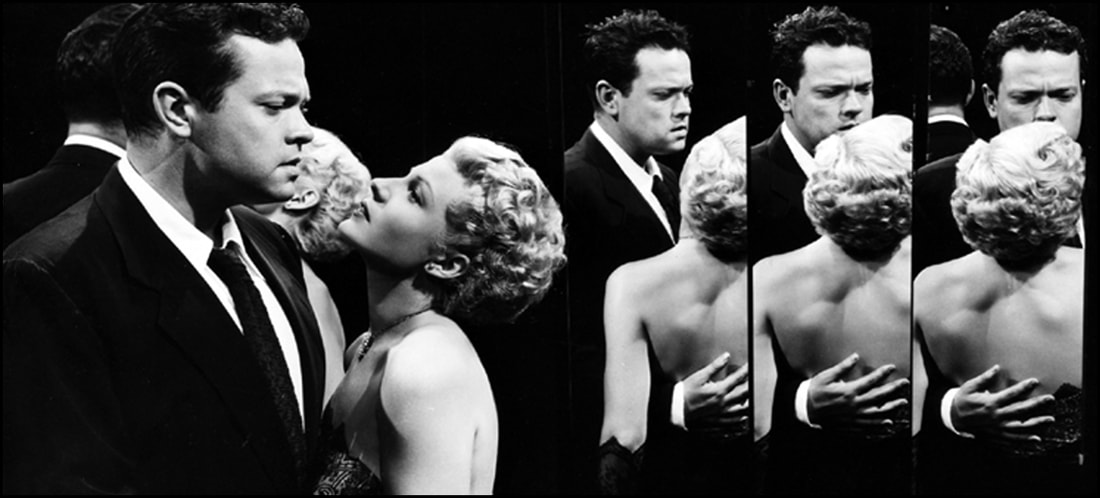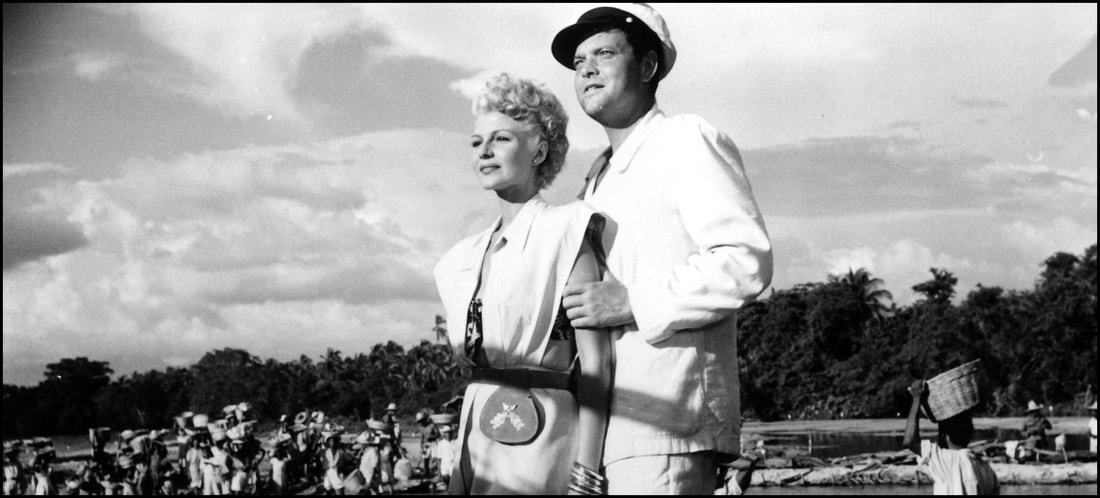See, I was raised in an era wherein his Citizen Kane (1941) was the cinematic benchmark of record. (It still is, so far as this old mind is concerned.) Fascinated with the film, I rather ravenously read anything I could get my hands on, including sources the college library could borrow via some intra-institution network. (This was well before the days of the internet, young readers.) In fact, almost any opportunity I had to write a paper for whatever the class, I tried to make it about some element of Kane. I dissected the picture from almost every angle I could, and I even hosted a screening of it (alongside a faculty cosponsor) for students, professors, and the community. (Yes, it had a respectable turnout even for a small Midwestern town.) Though I don’t consider myself an expert in any regard, I will concede that I know more than your average bear.
So it was very natural for me to begin to dig deeper into the filmmaker’s other works, and the one that was almost always recommended to me for study was 1947’s The Lady From Shanghai. It certainly came up an awful lot in my reading, and – when I finally sat through it – I could understand and appreciate why, though I disagreed with those who felt it was as fulfilling a feast as was Kane. Unlike the Welles’ debut, Shanghai felt more than a bit incomplete in places, if not even a bit of a step backward as to how much he had pioneered a new way of storytelling in the 1941 feature. Much of this is owed, I believe, to the fact that the filmmaker never finished the project as he intended, leaving the end result an occasionally cock-eyed masterpiece in search of all its parts.
(NOTE: The following review will contain minor spoilers necessary solely for the discussion of plot and/or characters. If you’re the type of reader who prefers a review entirely spoiler-free, then I’d encourage you to skip down to the last few paragraphs for the final assessment. If, however, you’re accepting of a few modest hints at ‘things to come,’ then read on …)
From the product packaging:
“Hired to work on a yacht belonging to the disabled husband of femme fatale Rita Hayworth, Welles plays an innocent man drawn into a dangerous web of intrigue and murder.”
Let it be known: there has been a great deal written about The Lady From Shanghai.
Quite frankly, there’s been so much written that it grows difficult to even attempt summarizing the whole affair briefly, so let’s just understand that the film – before, during, and after its production – has been the subject of great controversy. Its conception alone is a topic that defies a conventional explanation, and – given the fact that its two stars (Welles and Hayworth) were in the midst of a tumultuous marital separation at the time of its making – I doubt that we’ll ever truly know the bottom line of what its true potential was: the first cut clocked in at an incredible 150 minutes while the finished product runs a mere 88 minutes. What was lost? Like I said, we’ll never really know.
So … setting aside all of that fodder, we’re left with a film that both resembles other film noirs of its day but has a bit something extra, that being some of the screen’s more dazzling visuals as provided by the master himself, Orson Welles. The storyteller had his own unique style, much of which has been historically tied to the use of deep focus photography, allowing the director to cram an awful lot of substance (i.e. nuance and subtext) into each and every frame. In my opinion, none of it here quite approaches the level he achieved with Citizen Kane (1941) – a bravura performance on every conceivable level – and that’s likely owed in part to the fact that Shanghai was taken away from the director and given over to another editor in post. As a result, whatever spell Welles ultimately hoped to weave here likely never made it to the screen or only survives in unconnected pieces.
Considering what we’re left with, Shanghai only occasionally achieves a level of effective storytelling, instead leaving an awful lot to be desired.
At its core, I suspect that Welles intended for Shanghai to be an observation on the evil that exists between a certain caste of people, and that’s my only honest guess. While O’Hara is far from squeaky clean (his past suggests more than a few run-ins with authority as well as his fellow man), there’s still a bit of an everyman quality to him, one who functions from a foundation of ‘don’t wrong me, and I won’t wrong you.’ He’s dragged against his best judgment into this skullduggery via his own shortcomings with physical lust, and – like those he inevitably serves, observes, and ultimately defies – he’s shackled with consequences as a result of his participation. He’ll spend the remainder of his days recalling his part in the sordid affair – a fair cost for his momentary weakness – but the true instigators punched their tickets with the exchange of their mortal souls, a heavier price indeed.
Lastly, I’d be remiss in my duties in this space if I failed to mention that, in 2018, the U.S.’s National Film Preservation Board inducted Shanghai into the National Film Registry. For those unawares, the Registry selects twenty-five pictures each year to add to its vaults seeking to preserve features that have shown historical, cultural, and aesthetic contribution to the medium. Such an induction certainly underscores the relevance of the completed product: I just wish that, additively, the picture made a bit more sense.
The Lady From Shanghai (1947) was produced by Mercury Productions. DVD distribution (for this particular release) is being coordinated by the good people at Kino Lorber. As for the technical specifications? Though I’m no trained video expert, I thought the sights and sound of this black-and-white classic were fabulous from start-to-finish. As for the special features? The disc boast an incredible three commentary tracks (film historian Imogen Sara Smith, critic Tim Lucas, and filmmaker Peter Bogdanovich all dissect the picture and, frankly, there’s a great deal of overlap), some extra observations by Bogdanovich and film noir historian Eddie Muller, and the theatrical trailer. So – yes – there’s a great deal of information available that should keep fans interested for hours.
Highly recommended.
As imperfect as it is, The Lady From Shanghai is one of the motion pictures that’s gloriously imperfect, offering up ample opportunity to sit and watch the genius of Orson Welles at work, even when his trickery might be at the expense of a functional narrative. Alas, film noirs have rarely made perfect sense, so don’t look for this film’s storyline and characters to add up to anything more than a crew of mismatched strangers coming together and falling apart between the rise of action until the credits roll. Gloriously imperfect? Why, that’s likely a phrase even Orson would approve …
In the interests of fairness, I’m pleased to disclose that the fine folks at Kino Lorber provided me with a complimentary Blu-ray of The Lady From Shanghai (1947) by request for the expressed purposes of completing this review; and their contribution to me in no way, shape, or form influenced my opinion of it.
-- EZ



 RSS Feed
RSS Feed